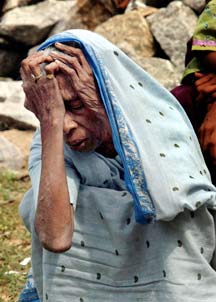Posted: 1/20/06
|
| Carol Hess of Slidell, La., breaks down in tears after meeting with her insurance adjuster to assess hurricane damage to her home after Hurricane Katrina. Images like this prompted an outpouring of charitable giving to disaster relief and recovery in 2005. (Photo by Scott Threlkeld/Newhouse News Service) |
MORE BLESSED TO GIVE:
Disasters prompt outpouring
of gifts to charitable causes
By Ken Camp
Managing Editor
News reports and televised images of suffering by South Asian tsunami victims or hurricane-ravaged Gulf Coast residents prompted Americans to reach deep into their pocketbooks to give last year.
But some observers continue to question whether giving to meet urgent, high-profile needs hurts or helps ongoing charitable causes–including churches and faith-based ministries that help poor people.
Americans gave more than $2.7 billion to aid Gulf Coast hurricane victims in 2005–an amount near the total charitable gifts that followed the 9/11 terrorist attacks, the Chronicle of Philanthropy reported. About two-thirds of those donations went to the American Red Cross.
 |
| A 60-year-old woman weeps from pain while waiting to see doctors attending to tsunami survivors in Sri Lanka's Kattankudy camp. Images like this prompted an outpouring of international giving to relief and recovery efforts in 2005. (Photo by Rob Finch/Newhouse News Service) |
International giving to Baptist World Aid–the relief and development arm of the Baptist World Alliance–topped $2.49 million for tsunami aid and $364,000 for the Gulf Coast hurricanes, as well as $135,000 for an earthquake in Pakistan.
The Southern Baptist Inter-national Mission Board reported $16.8 million in contributions for tsunami relief, plus more than $182,600 for the Pakistan earthquake, and the North American Mission Board reported more than $21.9 million in disaster relief giving related to the Gulf Coast hurricanes.
Texas Baptists gave more than $5.8 million in disaster relief gifts in 2005 through the Baptist General Convention of Texas–$1.48 million to aid victims of the South Asia tsunami and $4.37 million for relief and recovery following the Gulf Coast hurricanes.
Donor Fatigue?
Early indicators for charitable giving in 2005 don't show clear signs of the “donor fatigue” some analysts feared would occur. But other signs seem to show contributors may have shifted some discretionary charitable dollars to disaster relief and away from other causes.
For instance, while Texas Baptists gave record amounts to disaster relief and posted an increase in Texas Cooperative Program giving, the Mary Hill Davis Offering for Texas Missions and the Texas Baptist Offering for World Hunger gifts both dropped 9 percent from the previous year.
Likewise, the Cooperative Baptist Fellowship received $2.6 million for tsunami relief and more than $1.1 million for Gulf Coast hurricane relief in 2005. But gifts to the CBF undesignated fund and to the Global Missions Offering both were down 3 percent in fiscal 2004-2005.
In contrast, Buckner Baptist Bene-volence saw no downturn in giving because of the disasters, officials with the agency reported.
“In looking back over the year, it appears that many people responded generously to tsunami and hurricane relief but also continued to support our ongoing ministries,” said David Slover, executive vice president of Buckner Foundation.
That kind of response, he noted, indicates that “our support base is well-informed about not only emergency needs and responses but also is faithful to respond to the everyday needs of children and families who are experiencing critical issues in their lives,” he added.
A national survey conducted by the Center on Philanthropy at Indiana University showed most fundraisers for nonprofit organizations didn't believe disaster relief giving hurt their causes, but a majority believed charities in general suffered.
Only one-third of the fundraisers who responded agreed or strongly agreed that giving to hurricane relief came at the expense of their own organizations. But 58 percent agreed disaster-related giving hurt other charities in the short-term, while only one-fourth of the respondents disagreed or strongly disagreed with this idea.
“When a big disaster happens, it heightens the philanthropic impulse,” said Daniel Borochoff, president of the American Institute of Philanthropy, a charity watchdog group in Chicago.
Poverty's cause & effect
But generous gifts for disaster relief don't necessarily mean more money to address poverty's long-term effects or root causes. After a random disaster like a hurricane, people open their wallets because they recognize they could easily have been the victims, Borochoff said.
“Unfortunately, Americans have been less generous toward those they feel are poor because they have made bad choices,” such as out-of-wedlock births that trap women in poverty, he said. While overall charitable giving finished 2005 strong, contributions to benefit ongoing human needs slumped.
“It is the only category of giving that has experienced a decline in each of the last three years,” Borochoff said. Americans donate about $250 billion a year to all charities, including churches, but only $19 billion goes to meet human needs, he noted.
“I think it parallels some of the political thinking of the government cutting back,” he said, pointing to efforts to cut welfare, food stamps and other programs for the poor. “Some people are being judgmental, viewing some poor people as less-deserving victims than others.”
And some Americans apparently think their obligation to poor people is met through taxes. Scott Burns, business and finance columnist for the Dallas Morning News, wrote a Christmas column about IRS statistics that indicate charitable giving declines as income rises. In a follow-up column, he quoted from readers who took issue with him for “stoking the fires of class warfare” and failing to consider the tax burden borne by wealthy people.
“Many people see taxes as charitable giving, since much of it goes to support the poor,” one respondent wrote.
People who rationalize their failure to contribute to human-needs charities by pointing to the taxes they pay miss a fundamental difference between tax dollars and charitable gifts, said Suzii Paynter, director of citizenship and public policy with the Texas Baptist Christian Life Commission.
“Charitable giving is voluntary. Taxes are not,” she said. “Charitable giving is a reflection of character. Taxes are a reflection of legal obligation.
“The kind of charity found in the Bible is an unselfish, contagious love for others that results in joyous sacrifice on their behalf. The charitable giver wishes she could do more. The taxpayer doesn't.”
Determine priorities
When it comes to public policy decisions that impact poverty, Americans “have to figure out what our priorities are,” said Yonce Shelton, policy director for Call to Renewal, a faith-based anti-poverty group. He pointed to the battle in Washington over the federal budget, noting some lawmakers are using the popular support for hurricane relief as an excuse to cut other social programs.
Religious leaders need to challenge politicians to make long-term poverty solutions a priority–in the hurricane region and nationwide, Shelton insisted. That will require being open to solutions offered from both ends of the political spectrum, he said, and “breaking down barriers that keep those two from talking to each other.”
“If we can find some ways to drop some of the traditional battles, overcoming poverty can really be a nonpartisan issue,” Shelton said. While no such shift in thinking is evident in the political arena, Katrina and other recent disasters are “hammer blows to the conscience,” forcing Americans to see poverty differently, said Tom Prevost, who directs a Cooperative Baptist Fellowship anti-poverty initiative.
“It does appear that Katrina response is riveting more attention on endemic poverty in America,” said Prevost, national coordinator of Together for Hope, the Cooperative Baptist Fellowship's rural poverty initiative–a 20-year commitment to fight poverty in the nation's poorest counties.
“Katrina did bring some sort of raised awareness,” agreed Alice Archibald, development director for America's Second Harvest, one of those charities that has benefited from the post-Katrina generosity.
The organization, which collects both funds and food to supply a network of 200 food banks nationwide, sent 1,700 truckloads of food–worth $82 million–to the Gulf region after Katrina. It also provided warehouse space for other relief organizations and helped in other ways.
Bouyed by cash gifts of $26 million for Katrina relief, Second Harvest easily made its $32 million fund-raising goal, Archibald said.
But it's too early to tell if that generosity will last, she said, and turn into long-term support–both for aid groups like hers that address immediate poverty needs or those that try to bring people out of poverty. Nonetheless, she is encouraged.
People gave to Katrina victims because the needs were so obvious, she said. But they also saw how poverty put hurricane victims at higher risk. And they recognized that poverty puts people at risk all over the country.
“People understand the issue more now,” she continued. “It does allow us to tell our story as we move forward.”
Signs of hope
Prevost looks overseas for hopeful signs. He said the unprecedented international response to the South Asia tsunami, as well as the debt-relief campaign for Africa, have awakened previously uninvolved Chris-tians.
Some of those mobilized Christians have volunteered in overseas projects, and that creates a positive “spillover effect,” he continued. “Those who have seen some of this face to face in these poverty-ridden counties are more sensitive.”
“There seems to be a growing awareness that it's going to take more than a quick fix” to reduce poverty at home and abroad, Prevost said.
The CBF initiative is “a long-term commitment to self-sustainability” in historically poor communities, Prevost said. The program helps the poor recognize they have the resources to change their economic destiny.
“They just feel alone,” he said of the entrenched poor. “And to know someone is going to be with them for 20 or more years, that's the thing that really seems to change the conversation. … They are tired of hit-and-run missions.”
A long-term solution to poverty will require all these elements–volunteerism, money and a long-term commitment–as well as political action to change public policy.
“There needs to be more concern for what is happening in our communities, more concern for the public witness that we have,” Prevost concluded.
With additional reporting by Greg Warner of Associated Baptist Press
News of religion, faith, missions, Bible study and Christian ministry among Texas Baptist churches, in the BGCT, the Southern Baptist Convention ( SBC ) and around the world.


